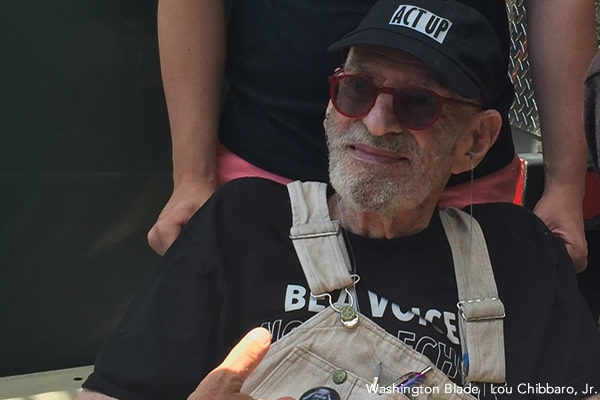Queer Liberation March Retraces Route of World’s First Pride March
The Queer Liberation March, the second of two marches in New York City on Sunday that commemorated the 50th anniversary of the Stonewall riots, drew more than 45,000 marchers according to one of its lead organizers.
Longtime lesbian activist Ann Northrop, who is among the leaders of the Reclaim Pride Coalition, which organized the Queer Liberation March as an alternative to the official New York City Pride March, said organizers believe the Queer march was highly successful and are considering making it an annual Pride event.
The march followed the same route that the world’s first ever LGBT Pride march took in June 1970. It was organized by activists who were inspired by the now famous Stonewall Riots that erupted in New York’s Greenwich Village in response to a police raid on the Stonewall Inn gay bar on June 28, 1969.
That first march was named the Christopher Street Day Liberation March after the street where the Stonewall Inn is located and where the rioting began and continued for several days and that has been credited with launching the modern LGBT rights movement.
Northrop and others involved with the Reclaim Pride Coalition said they wanted the Queer Liberation March to retrace the route of the 1970 march, which travelled from the site of the Stonewall Inn to Central Park, where a rally was held, and using 6th Avenue to reach the park.
Organizers of Sunday’s Queer Liberation March and its own rally held in Central Park noted they chose not to allow floats, including the large corporate sponsored floats that participated in the official New York City Pride March, saying such displays were not in keeping with the atmosphere of protest and rebellion associated with Stonewall.
“This exceeds our wildest expectations,” Northrop told the Blade at the rally. “This was spectacular, and we’re thrilled that everybody took the leap of faith with us to come out, because this was a whole new thing,” she said.
“And we just organized it from the ground up. And we had no idea how many would put themselves on the line and show up. And they did,” Northrop said. “They did with full hearts and they did with total creativity.”
Among the speakers at the rally held in Central Park’s Great Lawn was Larry Kramer, the playwright and nationally recognized gay and AIDS activist who co-founded the AIDS protest group ACT UP.
Kramer, who appeared on a stage set up at the rally site in a wheelchair, gave a pessimistic view of the state of the nation’s fight against AIDS and anti-LGBT oppression and bias close to 40 years after he began that fight in the early 1980s.
“There is no cure for this plague,” Kramer told the rally. “Too many among us still get infected. We have become too complacent with PrEP,” he said, referring to the HIV prevention drug. “We search for a cure and we’re still in the Stone Age. The treatments we have are woefully expensive and come with troublesome side effects. And their manufacturers are holding us up to ransom,” he said.
“I almost died three times,” said Kramer. “I started a couple of organizations to fight against the plague. In the end, we failed. I certainly feel that I failed.”
That comment drew shouts from people in the audience saying, “No you haven’t” and “We love you.”
Kramer responded calling on the LGBT community to “fight back” against what he called a current dangerous political climate.
“If you love being gay as much as I do, fight back,” he said. “Our world needs every bit of help it can get, because I do not see enough of us fighting this fight and performing our duty,” said Kramer, adding: “Please all of you do your duty of opposition in these dark and dangerous days.”
Kramer was joined on stage by more than a dozen activists, with some displaying ACT UP signs and who chanted the slogan that Kramer and his 1980s era activists coined at numerous protests: “Act Up! Fight back! Fight AIDS!”

Transgender activists Sasha Alexander and Olympia Sudan were among more than a dozen other speakers at the rally who reminded the gathering of the violence and threats faced by transgender people, especially transgender women of color.
The two joined other speakers, both trans and cisgender, in calling on the LGBT community and the public at large to remember and give credit to the late Marsha P. Johnson and Sylvia Rivera, two trans women of color who played an important role in the Stonewall riots and subsequent organizing for LGBT rights.
Several speakers called for he decriminalization of sex work, saying the current criminalization of prostitution adversely impacts trans women of color who are forced into sex work as a means of economic survival due to job discrimination.
The lesbian singing group Betty was among the singers and other artists performing at the rally.
Northrop said the city’s parks department required that the rally take place in the Great Lawn, which is located one mile from where the march entered Central Park at 6th Avenue, making the total length of the march four miles. She said organizers will consider shortening the march if organizers decide to hold the Queer Liberation March again next year and in subsequent years.
“Everyone’s talking about it,” she said in discussing whether another Queer march should take place. “Now that we’ve seen this become a reality and people can believe it’s possible I hope then we would just grow bigger and bigger every year and that the corporate takeover of Pride would gradually phase out.”